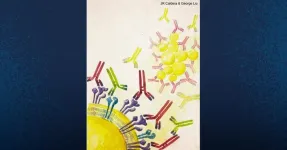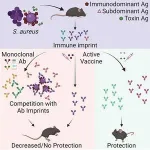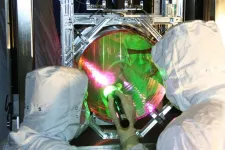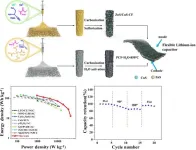(Press-News.org) Staphylococcus aureus (SA) is an extremely common bacterial infection; about 30% of people have colonies of SA living in their nose. SA is often harmless, but it is also a leading cause of hospital-acquired and community-associated infections. A vaccine for SA would be a game-changer for public health, but for decades, all vaccine candidates for SA have failed in clinical trials despite successful preclinical studies in mice. Researchers at University of California San Diego School of Medicine have finally explained why.
In a new study, published January 16, 2024 in Cell Reports Medicine, they tested a new hypothesis that SA bacteria can trick the body into releasing non-protective antibodies when they first colonize or infect humans. When the individual is later vaccinated, these non-protective antibodies are preferentially recalled, making the vaccine ineffective.
SA has a unique relationship with humans. While it causes many dangerous health complications, including wound and bloodstream infections, the bacterium is also a normal part of the healthy human microbiome, where it lives peacefully in the nose and on the skin.
“SA has been with humans a long time, so it’s learned how to be part-time symbiont, part-time deadly pathogen,” said senior author George Liu MD, PhD, professor in the Department of Pediatrics at UC San Diego School of Medicine. “If we’re going to develop effective vaccines against SA, we need to understand and overcome the strategies it uses to maintain this lifestyle.”
The immune system releases protective antibodies in response to molecules it suspects are foreign, called antigens. These antibodies are then saved in the immune system’s memory, so the next time the immune system encounters that same antigen, it will generally recall its earlier immune response rather than mount a brand-new attack.
“This is an effective system for conferring long-term protection against pathogens, but it only works when the initial immune response to that pathogen was actually protective,” said co-lead author JR Caldera, PhD, who completed his doctoral research in the Liu Lab. “What sets SA apart is that the bacteria themselves have ways of evading the immune system from the moment they encounter us, and these evasive strategies are only reinforced by vaccination.”
While SA vaccines have unilaterally failed in clinical trials, they generally do well in preclinical studies of mice. In order to figure out why this is, the researchers collected blood serum from healthy volunteers, quantifying and purifying the anti-SA antibodies present in the samples. They then transferred these antibodies to mice to explore how protective they were against SA on their own, as well as how they influenced the efficacy of several clinically-tested SA vaccine candidates.
The researchers found that the vaccines were ineffective in mice that had been given human anti-SA antibodies, as well as mice that had been previously exposed to SA. However, in mice that had never been exposed to either SA or human antibodies, the vaccines worked. Unlike previous mouse studies of SA vaccines, the researchers’ results were consistent with those of failed clinical trials, suggesting that their experimental model could help predict the clinical success of SA vaccines while they are still being tested in preclinical mouse studies.
Further, they found that specific antibodies were to blame for the effect they observed. The antibodies that attack the cell walls of SA bacteria, which are the basis for most current SA vaccines, didn’t protect the mice against SA. By contrast, antibodies that target the toxins produced by SA were able to successfully neutralize them.
“One pathogen can have many different antigens that the immune system responds to, but there is a hierarchy as far as which antigen is dominant,” said co-lead author Chih Ming Tsai, PhD, a project scientist in the Liu Lab. “Most vaccines are based on the dominant antigen to trigger the strongest possible immune response. But our findings suggest that for SA, the rules are different, and it is more beneficial to target so-called subdominant antigens, which triggered a weak immune response in the first place.”
In addition to exploring the possibility of targeting new antigens with future SA vaccines, the researchers are also interested in exploring the deeper question at play here: why is the natural human immune response to this bacterium so ineffective to begin with?
“Somehow, SA is able to trick our immune system, and figuring out how will help us improve existing SA vaccines and develop new ones,” said Liu. “More broadly, these findings suggest a whole new way of reevaluating failed vaccines, which could have implications well beyond this one bacterium.”
Co-authors of the study include: Desmond Trieu, Cesia Gonzalez, Irshad A. Hajam, Xin Du and Brian Lin at UC San Diego.
This study was funded, in part, by the National Institute of Health (grants R01AI127406, R01AI144694 and R01AI181321).
###
END
We need a staph vaccine: here’s why we don’t have one
Research from UC San Diego explains the clinical failure of dozens of candidate vaccines for one of the most common human infections; it also suggests a way to fix the problem
2024-01-16
ELSE PRESS RELEASES FROM THIS DATE:
Analysis of breast cancer mortality in the US
2024-01-16
About The Study: Based on four simulation models, breast cancer screening, treatment of stage I to III breast cancer, and treatment of metastatic breast cancer were each associated with reduced breast cancer mortality between 1975 and 2019 in the U.S.
Authors: Sylvia K. Plevritis, Ph.D., of the Stanford University School of Medicine in Stanford, California, is the corresponding author.
To access the embargoed study: Visit our For The Media website at this link https://media.jamanetwork.com/
(doi:10.1001/jama.2023.25881)
Editor’s ...
Consumption of 100% fruit juice and body weight in children and adults
2024-01-16
About The Study: This systematic review and meta-analysis of 42 eligible studies, including 17 among children (n = 45,851) and 25 among adults (n = 268,095), found a positive association between intake of 100% fruit juice and weight gain in children. Analysis of cohort studies in adults found a significant positive association among studies unadjusted for total energy, suggesting potential mediation by calories; an analysis of trials in adults found no significant association between 100% fruit juice consumption and body weight. The findings ...
Employer-sponsored health insurance premium cost growth and its association with earnings inequality among families
2024-01-16
About The Study: The findings of this study of U.S. families receiving employer-sponsored health insurance suggest that three decades of increasing health care premiums were likely associated with reduced annual earnings and increased earnings inequality by race and ethnicity and wage level and were meaningfully associated with wage stagnation.
Authors: Kurt Hager, Ph.D., M.S., of the UMass Chan Medical School in Worcester, Massachusetts, is the corresponding author.
To access the embargoed ...
Experiences of interpersonal violence in sport and perceived coaching style among college athletes
2024-01-16
About The Study: The results of this survey study involving 4,119 currently competing U.S. college athletes suggest that interpersonal violence is associated with marked changes in the psychosocial health and emotional well-being of college athletes, particularly those who identify as female and with non-heterosexual sexual orientations. Variations in coaching style have the potential to alter these associations. Ongoing efforts are needed to leverage the unique position that coaches hold to help reduce interpersonal violence and create safe places where all college athletes can thrive.
Authors: Yetsa A. Tuakli-Wosornu, M.D., ...
Largest-ever study of palliative care demonstrates scalable strategy to increase support for seriously ill patients in the hospital
2024-01-16
PHILADELPHIA – Ordering a palliative care consultation by “default” – via an automatic order programmed into the electronic medical record that doctors may cancel if they choose – is an effective strategy to give more hospitalized patients the opportunity to benefit from palliative care, and sooner, according to a new study led by researchers from the Perelman School of Medicine at the University of Pennsylvania. Palliative care is specialized medical care focused on relieving the symptoms and stress of a serious illness and improving quality of life, in alignment with a patient’s ...
Cost of employer-sponsored health insurance is flattening worker wages, contributing to income inequality
2024-01-16
The rising cost of health insurance is an ongoing concern in the United States. New research shows that increasing health insurance costs are eating up a growing proportion of worker’s compensation, and have been a major factor in both flattening wages and increasing income inequality over the past 30 years.
In a study from the Friedman School of Nutrition Science and Policy at Tufts University, researchers found that the cost of employer-sponsored insurance (ESI) health care benefits increased much faster than workers’ wages since the late 1980s, ...
Palliative telecare significantly improves quality of life for those with chronic illnesses, and results last for months
2024-01-16
AURORA, Colo. (January 16, 2024) – Researchers from the University of Colorado Anschutz Medical Campus have found that a team intervention, provided by phone, leads to persistent improvements in depression, anxiety, and quality of life for people managing chronic illnesses. Additionally, researchers found that the improvement in quality of life results last months after intervention concludes.
In a study, published today in JAMA, researchers observe the impact a telecare intervention program, called ADAPT, has on veterans suffering from poor quality of life as a result ...
Experiment could test quantum nature of large masses for the first time
2024-01-16
An experiment outlined by a UCL (University College London)-led team of scientists from the UK and India could test whether relatively large masses have a quantum nature, resolving the question of whether quantum mechanical description works at a much larger scale than that of particles and atoms.
Quantum theory is typically seen as describing nature at the tiniest scales and quantum effects have not been observed in a laboratory for objects more massive than about a quintillionth of a gram, or more precisely 10^(-20)g.
The new experiment, described in a paper published in Physical Review Letters and involving researchers at UCL, the University of Southampton and ...
Ten scientists receive EMBO Installation Grants
2024-01-16
16 January 2024 – EMBO is pleased to announce that ten life scientists have been awarded EMBO Installation Grants, which support group leaders who will move to, or have recently moved to, countries participating in the scheme. The scientists’ inspiring research spans a wide range of biological processes: ageing, tumour biology, gut-brain axis communication, microbiota and gene editing tools are among the topics they are exploring.
One installation grantee will establish a laboratory in the Czech Republic, one in Greece, two in Hungary, ...
Dual-metal sulfides improve overall function of anode material in lithium-ion capacitors
2024-01-16
The use of dual metal sulfides, specifically ZnS/CuS, shows marked improvement in electrochemical stability and performance when included in the design of flexible lithium-ion capacitors over the use of transition metal sulfides and carbon fiber materials.
Technology is becoming more and more integrated with daily life, especially wearable, flexible tech and smart devices. Transition metal sulfide (TMS) materials are popular among choices for anodes in developing flexible lithium-ion capacitors ...
LAST 30 PRESS RELEASES:
Stem cells from human baby teeth show promise for treating cerebral palsy
Chimps’ love for crystals could help us understand our own ancestors’ fascination with these stones
Vaginal estrogen therapy not linked to cancer recurrence in survivors of endometrial cancer
How estrogen helps protect women from high blood pressure
Breaking the efficiency barrier: Researchers propose multi-stage solar system to harness the full spectrum
A new name, a new beginning: Building a green energy future together
From algorithms to atoms: How artificial intelligence is accelerating the discovery of next-generation energy materials
Loneliness linked to fear of embarrassment: teen research
New MOH–NUS Fellowship launched to strengthen everyday ethics in Singapore’s healthcare sector
Sungkyunkwan University researchers develop next-generation transparent electrode without rare metal indium
What's going on inside quantum computers?: New method simplifies process tomography
This ancient plant-eater had a twisted jaw and sideways-facing teeth
Jackdaw chicks listen to adults to learn about predators
Toxic algal bloom has taken a heavy toll on mental health
Beyond silicon: SKKU team presents Indium Selenide roadmap for ultra-low-power AI and quantum computing
Sugar comforts newborn babies during painful procedures
Pollen exposure linked to poorer exam results taken at the end of secondary school
7 hours 18 mins may be optimal sleep length for avoiding type 2 diabetes precursor
Around 6 deaths a year linked to clubbing in the UK
Children’s development set back years by Covid lockdowns, study reveals
Four decades of data give unique insight into the Sun’s inner life
Urban trees can absorb more CO₂ than cars emit during summer
Fund for Science and Technology awards $15 million to Scripps Oceanography
New NIH grant advances Lupus protein research
New farm-scale biochar system could cut agricultural emissions by 75 percent while removing carbon from the atmosphere
From herbal waste to high performance clean water material: Turning traditional medicine residues into powerful biochar
New sulfur-iron biochar shows powerful ability to lock up arsenic and cadmium in contaminated soils
AI-driven chart review accurately identifies potential rare disease trial participants in new study
Paleontologist Stephen Chester and colleagues reveal new clues about early primate evolution
UF research finds a gentler way to treat aggressive gum disease
[Press-News.org] We need a staph vaccine: here’s why we don’t have oneResearch from UC San Diego explains the clinical failure of dozens of candidate vaccines for one of the most common human infections; it also suggests a way to fix the problem




